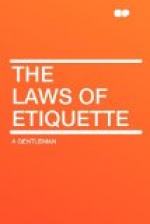There is no possible system of manners that will serve to exhibit at once the uncivility and the high refinement which should characterize the man of fashion. He must therefore have no manners at all. He must behave with tame and passive insolence, never breaking into active effrontery excepting towards unprotected women and clergymen. Persons of no importance he does not see, and is not conscious of their existence; those who have the same standing, he treats with easy scorn, and he acknowledges the distinction of superiors only by patronizing and protecting them. A man of fashion does not despise wealth; he cannot but think that valuable which procures to others the honour of paying for his suppers.
Fashion is so completely distinguished from good breeding, that it is even opposed to it. It is in fact a system of refined vulgarity. What, for example can be more vulgar than incessantly talking about forms and customs? About silver forks and French soup? A gentleman follows these conventional habits; but he follows them as matters of course. He looks upon them as the ordinary and essential customs of refined society. French forks are to him things as indispensable as a table-cloth; and he thinks it as unnecessary to insist upon the one as upon the other. If he sees a person who eats with his knife, he concludes that that person is ignorant of the usages of the world, but he does not shriek and faint away like a Bond-street dandy. If he dines at a table where there are no silver forks, he eats his dinner in perfect propriety with steel, and exhibits, neither by manner nor by speech, that he perceives any error. To be sure, he forms his own opinion about the rank of his entertainer, but he leaves it to such new-made gentry as Mr. Theodore Hook, in his vulgar fashionable novels, to harangue about such delinquencies. The vulgarity of insisting upon these matters is scarcely less offensive than the vulgarity of neglecting them. Lady Frances Pelham is but one remove better than a Brancton.
A man of fashion never goes to the theatre; he is waiting for the opera.
He, of course, goes out of town in the summer; or, if he cannot afford to do so, he merely closes his window-shutters, and appears to be gone.
Fashion makes all great things little, and all little things great.
It is commonly said, that it requires more wit to perform the part of the fool in a farce than that of the master. Without intending any offence to the fool by the comparison, we may remark, that qualities of an elevated character are required for the support of the role of a man of fashion in the solemn farce of life. He must have invention, to vary his absurdities when they cease to be striking; he must have wit enough to obtain the reputation of a great deal more; and he must possess tact to know when and where to crouch, and where and when to insult.




